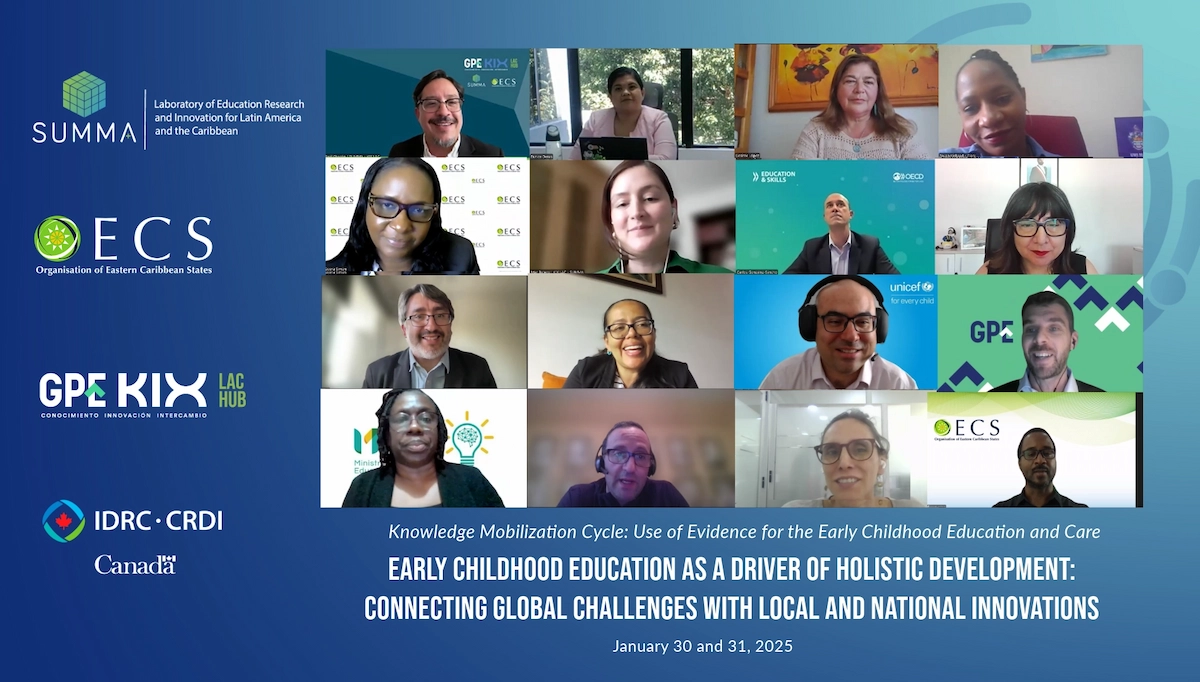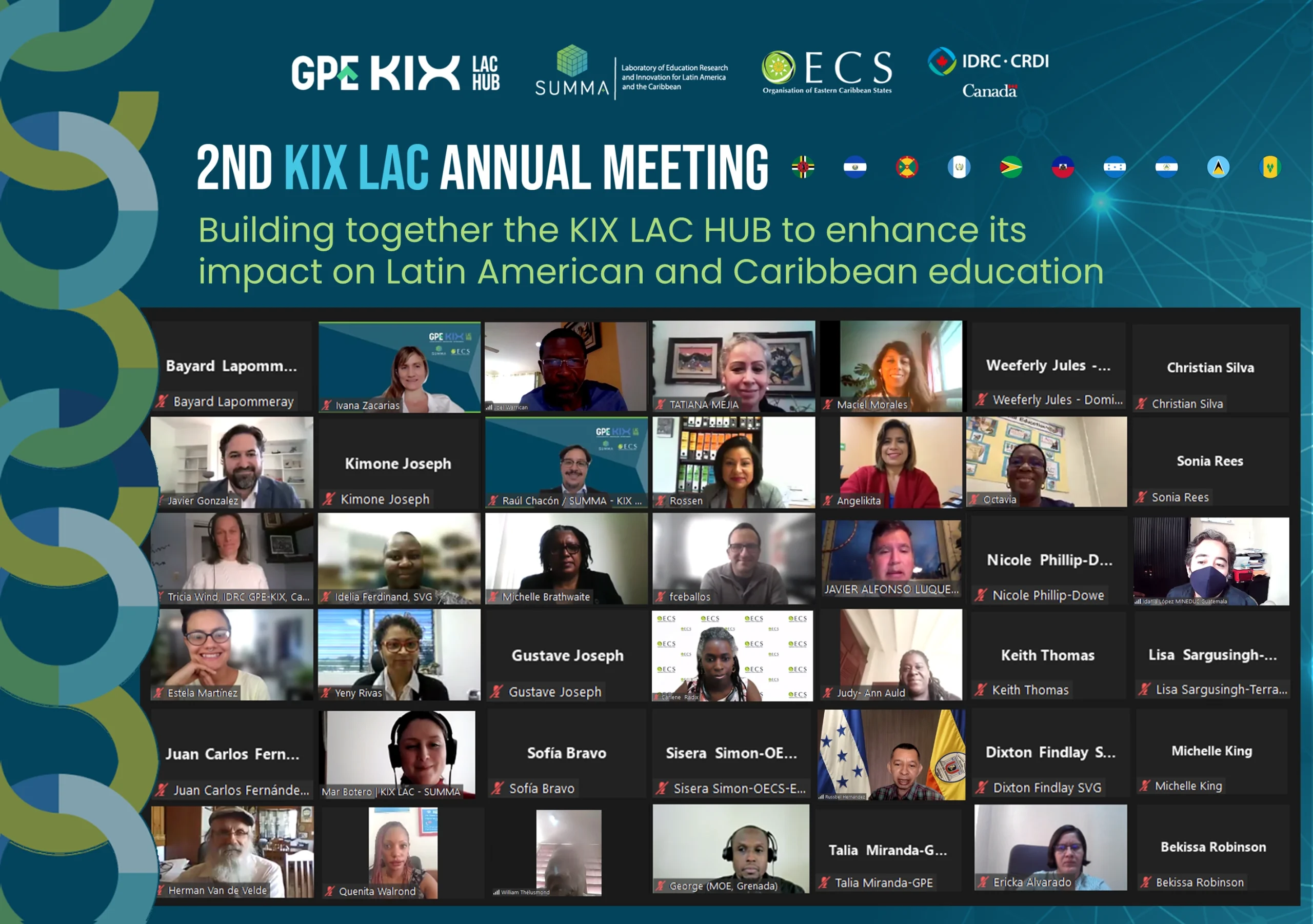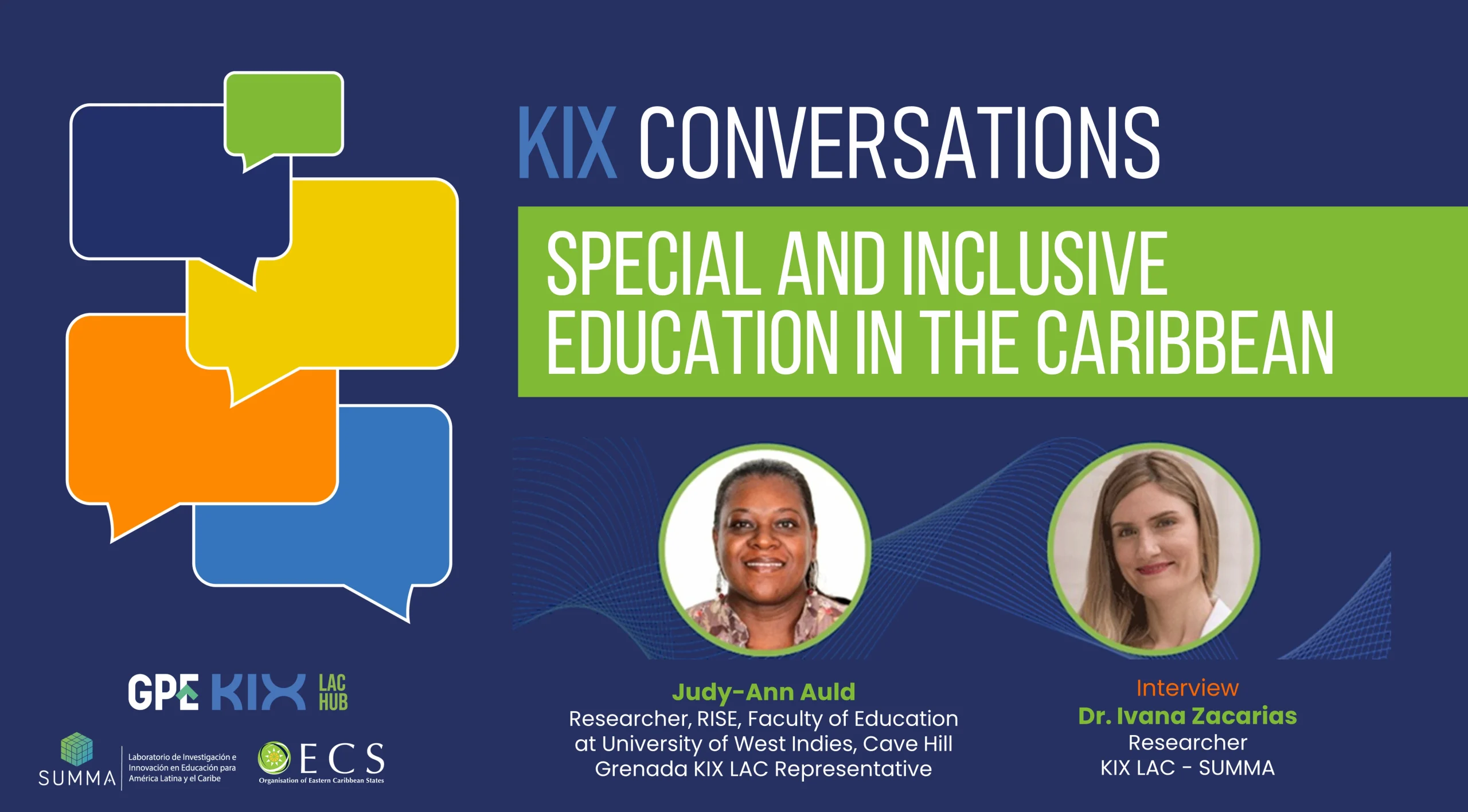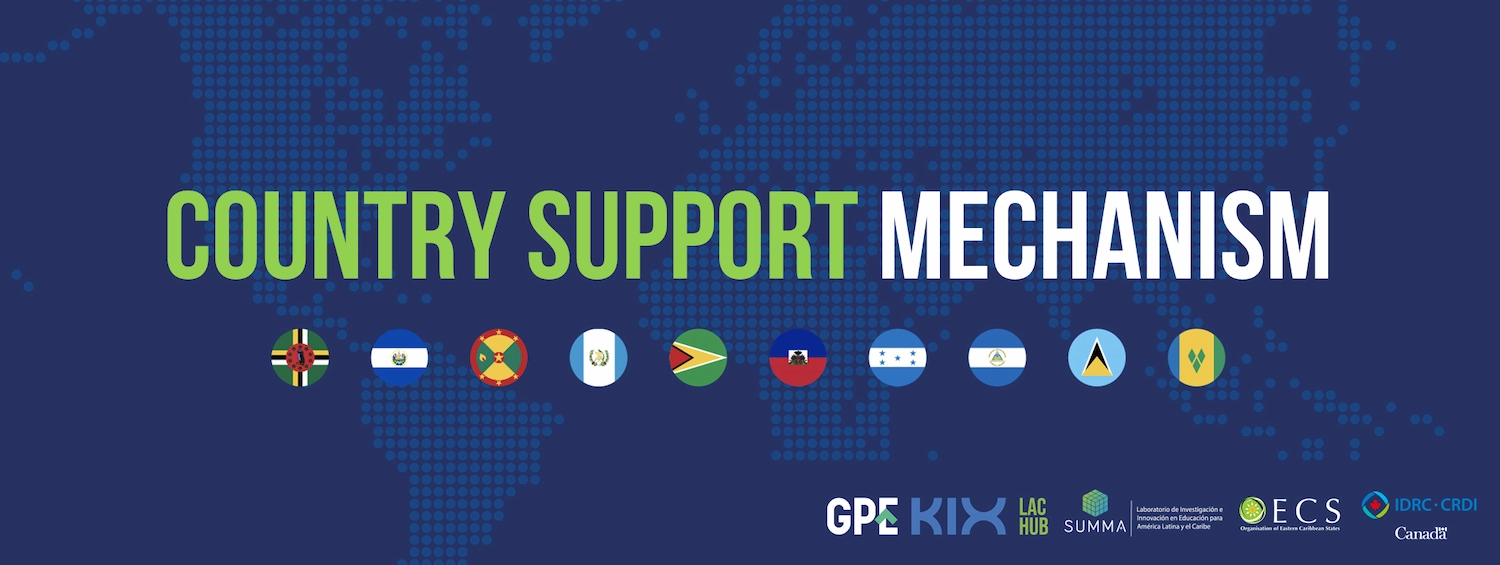KIX LAC launched the Early Childhood Education Knowledge Mobilization Cycle
11 de February de 2025

Share
Watch recording webinar: ➡️Session #1 || ➡️ Session #2
SUMMA – KIX LAC, with the support of the Global Partnership for Education (GPE) and the International Development Research Center (IDRC), launched the new Knowledge Mobilization Cycle: Use of Evidence for the Early Childhood Education and Care on January 30 and 31, 2025. The start of this cycle was marked by the webinar “Early Childhood Education as a driver of holistic development: connecting global challenges with local and national innovations.”.
This meeting marked the beginning of a new stage of work focused on Early Childhood, which will take place throughout 2025 and will address the challenges and priorities of early childhood education in Latin America and the Caribbean, connecting global, regional and practical perspectives to highlight its relevance and the importance of collaboration and investment in effective educational solutions.
Day 1
Raúl Chacón, Director of KIX LAC, welcomed the attendees and highlighted the relevance of the new cycle, focused on Early Childhood Education (ECE), as a key space to identify specific needs related to child development and promote collaborations adapted to the contexts of each country.
Next, Dante Castillo, Director of Policy and Innovative Practices at SUMMA, analyzed the most critical issues facing early childhood education in the region. Among the challenges identified, he highlighted the lack of institutionalization in teacher training and the cultural conceptions that see educational centers only as spaces for care, without recognizing their role in the comprehensive development of children. Castillo emphasized the importance of working together and sharing knowledge as key strategies for moving towards innovative and sustainable solutions.
Subsequently, Carlos González-Sancho, Policy Analyst in the Early Childhood and Schools Division, Directorate for Education and Skills at the OECD, presented the latest report in the Starting Strong series, entitled “Reducing Inequalities by Investing in Early Childhood Education and Care”. It shared findings on the influence of the family on early literacy and numeracy skills, highlighting the need to prioritize the most vulnerable children and improve access to quality educational services. This report proposes a roadmap with five key areas: broadening participation by removing barriers, strengthening interaction between educators and children, making ECE more inclusive, connecting services to communities, and improving governance and the need for sustainable and equitable financing.
Continuing with the presentations, Dr. Eunice Deras, Executive Director of the Crecer Juntos Institute (ICJ) of El Salvador, provided details on the “Crecer Juntos” policy designed to ensure comprehensive early childhood development, prioritizing children from gestation to age 8. This cross-sector initiative has promoted key legal reforms, such as the programs “Nacer con Cariño” for respected childbirth, “Crecer Juntos” for child protection and “Amor Convertido en Alimento” to promote breastfeeding. In education, the “My New School” program modernizes infrastructure and curriculum, while the “Tree of Life” collection promotes early reading. With decentralized management teams throughout the country, Crecer Juntos seeks to guarantee equitable access to education and protection, including migrant children and those in vulnerable contexts, thus ensuring more inclusive development.
Sisera Simon, Head of the Humanities and Social Sciences Division of the Organization of Eastern Caribbean States (OECS), analyzed early childhood education in the region, pointing to challenges such as low coverage, lack of standardization in schools, shortage of specialized teachers and insufficient funding. To address these challenges, strategies have been implemented such as the creation of a regional curriculum framework, the strengthening of collaboration between sectors and the development of digital platforms for teacher training. Assessments in reading and mathematics have also been promoted to measure the impact of early education and improve policies in the region.
After an enriching exchange of questions and comments between the participants and the speakers, it was the turn of Zoyah Kinkead-Clark, Senior Lecturer in Early Childhood Education at the University of the West Indies, Mona, who addressed early childhood education in the Caribbean and evaluated the quality of education in three dimensions: processes, structure and system, pointing out that the health crisis aggravated inequalities. To address these challenges, strategies such as teacher training, the implementation of programs led by academia and collaboration between sectors have been promoted.
To close the first day, Desirée López de Maturana Luna, Vice President of the World Organization for Early Childhood Education (OMEP) for Latin America, highlighted the need for state commitment to ensure universal access to early childhood education. He highlighted the role of non-governmental organizations and strategic alliances in strengthening early childhood education, although challenges remain, such as lack of funding and recognition of non-formal programs. He also discussed dialogic learning as a tool for fostering citizenship from childhood, promoting co-responsibility among institutions, communities and families. Finally, he indicated that the experiences in Honduras and Guatemala demonstrated that the active participation of families in decision-making improves educational results and contributes to a more inclusive education.
Day 2
To begin the second day, Claudia Lagos, Undersecretary of Early Childhood Education of the Chilean Ministry of Education, spoke about the progress made in early childhood education, highlighting the joint work between education, health and social protection for child development. She highlighted the creation of the Undersecretariat of Nursery Education in 2015 and the evolution of the “Chile Crece Contigo” program to “Chile Crece Más”, expanding coverage from gestation. Among the key achievements, he highlighted priority access for the most vulnerable 60%, child mental health care and the development of inclusive materials. However, she pointed out the need to expand coverage with territorial equity, strengthen local articulation and consolidate progress in the framework of the National Policy for Children and Adolescents 2024-2032.
Continuing with the national cases, Belkis Hernández, Deputy Director General of Pre-Basic Education of the Secretariat of Education of Honduras, presented her country’s efforts to improve educational services in rural communities. She highlighted the Community Centers for Pre-Basic Education (CCEPREB), which prepare children in rural areas for entry to the preschool level, and the National Commission for the Development of Alternative Non-Formal Education (CONEANFO), which provides early stimulation and training to families with children from 0 to 3 years of age. He also highlighted the Intercultural Bilingual Education Centers, which guarantee contextualized teaching in indigenous communities, and the Education at Home program (EDUCAS), which allows trained mothers and tutors to teach children without access to nearby educational centers. Finally, he highlighted the teacher training strategies in rural areas, the provision of teaching materials and reading and writing strategies in early education, as well as the creation of the “Champion Municipalities for Education” program to improve educational indicators.
To close this segment, Astra Mckenzie, National Coordinator of OECO-PEARL (Program for Educational Advancement and Relevant Learning), Ministry of Education, Grenada, presented on the implementation of the High Scope curriculum in early childhood education in Grenada, Antigua and Barbuda, and St. Kitts and Nevis. He highlighted its focus on participatory learning and structured play, but also noted challenges such as lack of resources, insufficient support for teachers, and resistance to change. To overcome these obstacles, ongoing training, peer learning and teacher supervision have been promoted, as well as awareness campaigns for parents.
Agustín de la Varga González, Education Manager of UNICEF’s Regional Office for Latin America and the Caribbean, emphasized the importance of early childhood as a crucial stage where the foundations for brain development are formed, directly influencing the cognitive, emotional and social capacity of individuals. He stressed that, despite advances in policies and quality standards, challenges such as insufficient funding and lack of monitoring persist. He proposed strategies such as strengthening the legal framework, increasing investment in early childhood education and improving monitoring systems to design more effective interventions.
Concluding the second day, Joa Keis, Education Specialist for the Global Partnership for Education (GPE), opened his presentation by highlighting that early childhood education is the least funded sector with the weakest data systems. He mentioned promising strategies such as results-based budgeting in Peru, public-private partnerships in Central Asia, and the GPE co-financing model in El Salvador. He stressed the importance of policy dialogue and decentralization of resources to improve early childhood education in Latin America and the Caribbean. In conclusion, he reaffirmed GPE KIX’s commitment to strengthening the sector, promoting regional collaboration and the use of evidence in decision-making.
Finally and to close the event, Florencio Ceballos, Senior Program Specialist at IDRC, gave his final reflections remarking that Early Childhood Education is a priority for GPE KIX due to its impact on development and gender equity. She also assured GPE KIX’s commitment to strengthening early childhood education in Latin America and the Caribbean, promoting regional cooperation and the use of evidence to support decisions that generate a sustainable impact on the sector.
📍To participate you can update or add your data by completing this form.
📍For more information about the Cycle, you can write to Mar Botero (Coordinator of Knowledge mobilization and management of KIX LAC Communities) at mar.botero@summaedu.org.





















































































































